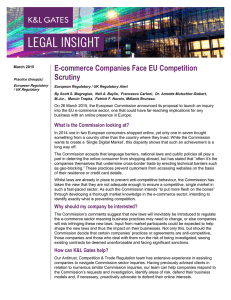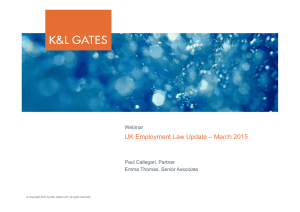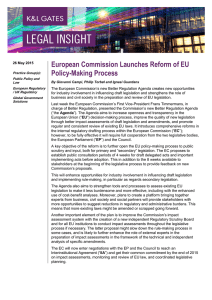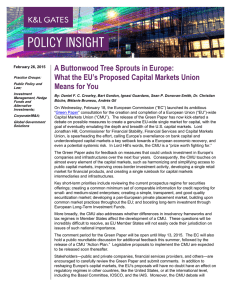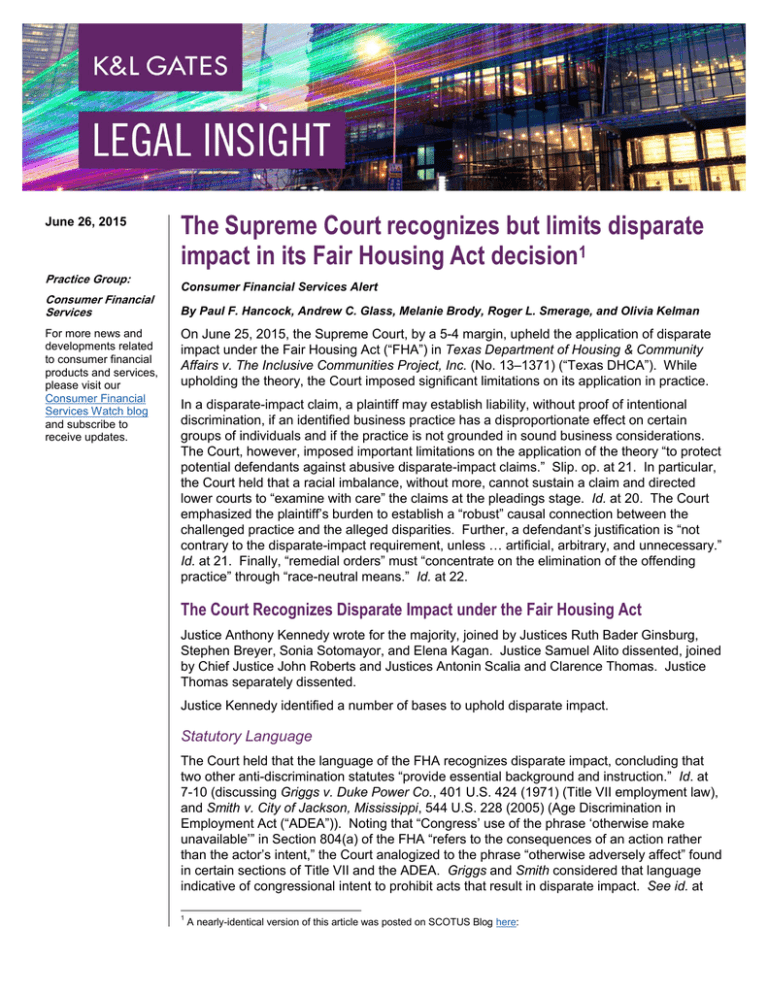
June 26, 2015
Practice Group:
Consumer Financial
Services
For more news and
developments related
to consumer financial
products and services,
please visit our
Consumer Financial
Services Watch blog
and subscribe to
receive updates.
The Supreme Court recognizes but limits disparate
impact in its Fair Housing Act decision1
Consumer Financial Services Alert
By Paul F. Hancock, Andrew C. Glass, Melanie Brody, Roger L. Smerage, and Olivia Kelman
On June 25, 2015, the Supreme Court, by a 5-4 margin, upheld the application of disparate
impact under the Fair Housing Act (“FHA”) in Texas Department of Housing & Community
Affairs v. The Inclusive Communities Project, Inc. (No. 13–1371) (“Texas DHCA”). While
upholding the theory, the Court imposed significant limitations on its application in practice.
In a disparate-impact claim, a plaintiff may establish liability, without proof of intentional
discrimination, if an identified business practice has a disproportionate effect on certain
groups of individuals and if the practice is not grounded in sound business considerations.
The Court, however, imposed important limitations on the application of the theory “to protect
potential defendants against abusive disparate-impact claims.” Slip. op. at 21. In particular,
the Court held that a racial imbalance, without more, cannot sustain a claim and directed
lower courts to “examine with care” the claims at the pleadings stage. Id. at 20. The Court
emphasized the plaintiff’s burden to establish a “robust” causal connection between the
challenged practice and the alleged disparities. Further, a defendant’s justification is “not
contrary to the disparate-impact requirement, unless … artificial, arbitrary, and unnecessary.”
Id. at 21. Finally, “remedial orders” must “concentrate on the elimination of the offending
practice” through “race-neutral means.” Id. at 22.
The Court Recognizes Disparate Impact under the Fair Housing Act
Justice Anthony Kennedy wrote for the majority, joined by Justices Ruth Bader Ginsburg,
Stephen Breyer, Sonia Sotomayor, and Elena Kagan. Justice Samuel Alito dissented, joined
by Chief Justice John Roberts and Justices Antonin Scalia and Clarence Thomas. Justice
Thomas separately dissented.
Justice Kennedy identified a number of bases to uphold disparate impact.
Statutory Language
The Court held that the language of the FHA recognizes disparate impact, concluding that
two other anti-discrimination statutes “provide essential background and instruction.” Id. at
7-10 (discussing Griggs v. Duke Power Co., 401 U.S. 424 (1971) (Title VII employment law),
and Smith v. City of Jackson, Mississippi, 544 U.S. 228 (2005) (Age Discrimination in
Employment Act (“ADEA”)). Noting that “Congress’ use of the phrase ‘otherwise make
unavailable’” in Section 804(a) of the FHA “refers to the consequences of an action rather
than the actor’s intent,” the Court analogized to the phrase “otherwise adversely affect” found
in certain sections of Title VII and the ADEA. Griggs and Smith considered that language
indicative of congressional intent to prohibit acts that result in disparate impact. See id. at
1
A nearly-identical version of this article was posted on SCOTUS Blog here:
The Supreme Court recognizes but limits disparate impact in its Fair Housing
Act decision
11-13. And, while the phrase “otherwise make unavailable” is not in Section 805 of the Act,
the Court concluded that the word “discriminate” in that section sufficed under Board of
Education of City School District of New York v. Harris, 444 U.S. 130 (1979). See id. at 11.
In dissent, Justice Alito rejected the Court’s view that the critical statutory language was the
phrase “otherwise make unavailable,” instead concluding that “they key phrase is ‘because
of.’” Slip op. at 3 (Alito, J., dissenting). He noted that on numerous occasions, the Court had
interpreted the phrase “because of” to mean “the ‘reason’ that the [person] decided to act.”
Id. (citing University of Texas Southwestern Medical Center v. Nassar, 570 U.S. ---, 133 S.
Ct. 2517, 2527 (2013)). Because the phrase is in both Sections 804 and 805, Justice Alito
concluded that “intent makes all the difference” and would have ruled that disparate impact
alone cannot give rise to liability under the Act. Id. at 5-6.
Writing separately, Justice Thomas took to task the Court’s reliance upon Griggs and its
interpretation of Title VII. Proffering that “[w]e should drop the pretense that Griggs’
interpretation … was legitimate,” he suggested that Title VII nowhere contained an express
or implicit prohibition on conduct that may produce a disparate impact. Slip op. at 1
(Thomas, J., dissenting).
Appellate Jurisprudence and Congressional Amendments
To support its opinion, the majority relied upon the post-enactment history of the FHA. The
Court noted that between the time of the statute’s enactment and 1988, when Congress
amended the Act, “all nine Courts of Appeals to have addressed the question had concluded
the Fair Housing Act encompassed disparate-impact claims.” Slip. op. at 13. Because
“Congress was aware of this unanimous precedent,” but nevertheless “made a considered
judgment to retain the relevant statute,” the Court concluded that Congress “accepted and
ratified” the holdings of the Courts of Appeals. See id. at 13-14. Justice Alito calls this
reasoning into question, noting that while the Courts of Appeals are entitled to “respectful
consideration,” the Court must not “ignore clear statutory language on the ground that other
courts have [consistently] done so.” Slip op. at 12 (Alito, J., dissenting).
The Court found further support in Congress’ 1988 amendments, namely “three exemptions
from liability that assume the existence of disparate-impact claims.” Slip op. at 14.
Reasoning that these exemptions, which addressed the role of property appraisals, drug
convictions, and occupancy restrictions under the Act, “were deemed necessary because
Congress presupposed disparate impact under the FHA as … enacted” and would otherwise
be “superfluous,” the Court found no other conclusion “logical.” Id. at 14-15. That one of
these exemptions—the one related to property appraisals—is located in Section 805 lent
further support to the Court’s conclusion that both Section 804 and Section 805 recognized
disparate impact. See id. at 15-16.
Legislative Purpose
The Court also articulated a basis in public policy to support its decision. The Court stated
that “[r]ecognition of disparate-impact claims is consistent with the FHA’s central purpose.”
Id. at 17. That purpose, like the policy behind Title VII and the ADEA, “was … to eradicate
discriminatory practices within a sector of our Nation’s economy.” Id. The Court pointed to
“zoning laws and other housing restrictions” that it viewed as “unfairly … exclud[ing]
minorities from certain neighborhoods without any sufficient justification.” Id. It concluded
2
The Supreme Court recognizes but limits disparate impact in its Fair Housing
Act decision
that “[m]uch progress remains to be made in our Nation’s continuing struggle against racial
isolation.” Id. at 24.
The Court Imposed Limitations on Disparate-Impact Claims
Although recognizing disparate impact under the FHA, the Court focused much of its
analysis on the “important and appropriate means of ensuring that disparate-impact liability is
properly limited.” Id. at 18. While the fuller implications of the Court’s decision will take time
to develop through application in the lower courts, aspects of the potential impact of the
ruling are discussed below.
Overbroad Application of Disparate Impact May Give Rise to Serious
Constitutional Questions
The Court warned that if the limitations described in Texas DHCA are not observed, “the
specter of disparate-impact litigation” under the FHA would “undermine[] its own purpose as
well as the free-market system.” Id. at 21. Adopting the position articulated in Justice
Scalia’s concurrence in Ricci v. DeStefano, 557 U.S. 557 (2009) (“disparate-impact
provisions place a racial thumb on the scales, often requiring employers to evaluate the
racial outcomes of their policies”), the Court cautioned that disparate-impact claims may
cause “serious constitutional questions.” Slip op. at 18. Such consideration can arise where
disparate impact is used “[w]ithout adequate safeguards at the prima facie stage” of a suit.
Id. at 20. In particular, the Court recognized that the “pervasive” use of disparate impact
“would almost inexorably lead governmental or private entities to use ‘numerical quotas,’”
that is the consideration of such factors as race, in housing-related decisions. Id. The Court
pointed to the Texas DHCA litigation as an example, questioning whether the “decision to
build low-income housing in a blighted inner-city neighborhood instead of a suburb is
discriminatory, or vice versa.” Id. Thus, the Court warned that to avoid a possible double
bind, “potential defendants may adopt racial quotas” in attempting to immunize the outcomes
of decisions from disparate impact challenge. Id. According to the Court, that type of
decision-making may itself run afoul of the equal protection clause.
Noting that disparate impact plays a role in “uncovering discriminatory intent,” and the Court
referenced challenges to zoning and land-use laws as “heartland,” or core, disparate-impact
cases. Id. at 17.
Courts Must Apply Safeguards at the Pleadings Stage to Protect Defendants
Given the constitutional questions to which an overbroad application of disparate impact may
give rise, the Court described the safeguards necessary “to protect potential defendants
against abusive disparate-impact claims.” Id. at 21. The Court emphasized that lower courts
must “examine with care” disparate-impact claims “at the pleading stage.” Id. The decision
empowers lower courts to dismiss claims at an early stage and without subjecting
defendants to expensive, and often intrusive, fact discovery. As the Court stated, “prompt
resolution of these cases is important.” Id.
In describing the requisite pleadings-stage safeguards, the Court relied upon Wards Cove v.
Atonio, 490 U. S. 642 (1989), in which it held that to sustain a disparate-impact case, a
plaintiff must identify a specific policy of the defendant and adequately plead that such policy
is the cause of the disparity. To distinguish meritless from meritorious claims, the Court
3
The Supreme Court recognizes but limits disparate impact in its Fair Housing
Act decision
directed lower courts to “avoid interpreting disparate-impact liability to be so expansive as to
inject racial considerations” into every FHA decision. Slip op. at 21. Thus, the Court held
that a “racial imbalance does not, without more, establish a prima facie case of disparate
impact,” and that a plaintiff can no longer maintain a disparate-impact claim by pleading a
mere “statistical disparity.” Id. at 19-20. Disallowing claims where a plaintiff cannot establish
a “robust” causal link to a defendant’s actual policies serves to eliminate suits seeking to hold
a defendant liable for alleged racial disparities it “did not create.” Id at 20. The Court held
that “[i]t may also be difficult to establish causation because of the multiple factors that go
into investment decisions about where to construct or renovate housing units.” Id. at 20-21.
Additionally, the Court outlined the contours of an important defense to a plaintiff’s prima
facie case, namely that “policies are not contrary to the disparate-impact requirement unless
they are artificial, arbitrary, and unnecessary barriers.” Id. at 21. Businesses must be given
“leeway to state and explain the valid interest served by their policies,” id. at 18, and should
be able “to make the practical business choices and profit-related decisions that sustain a
vibrant and dynamic free-enterprise system,” id. at 10.
Further, the Court cautioned, as it did in Wards Cove and Ricci, that when a defendant offers
a legitimate business justification, a plaintiff cannot sustain a disparate-impact claim if it
cannot prove “there is ‘an available alternative … practice that has less disparate impact and
serves the [entity’s] legitimate needs.’” Id. at 10. The Court’s decision appears to create a
more lenient standard for defendants than the standard the federal government has
proposed, in line with the Court’s holding in Wards Cove.
Finally, the Court held that “even when courts do find liability under a disparate-impact
theory,” remedial orders must “concentrate on the elimination of the offending practice”
through “race-neutral means.” Id. at 22. The Court appears to suggest that cases of this
type should not be subject to punitive sanctions and penalties.
Conclusion
While supporters of the disparate-impact theory may perceive the Court’s decision as a
“win,” the decision imposes significant limitations on the application of the theory, which
provide an important benefit to defendants in FHA cases. And the Court was clear in
directing lower courts to root out frivolous claims early in FHA litigation. The Court’s
limitations appear in tension with the U.S. Department of Housing and Urban Development’s
description of the theory contained in its 2013 disparate-impact rule. We expect these issues
to be played out in future litigation.
*
*
*
Authors:
Paul F. Hancock
Melanie Brody
Olivia Kelman
paul.hancock@klgates.com
+1.305.539.3378
melanie.brody@klgates.com
+1.202.778.9203
olivia.kelman@klgates.com
+1.305.539.3382
Andrew C. Glass
Roger L. Smerage
andrew.glass@klgates.com
+1.617.261.3107
roger.smerage@klgates.com
+1.617.951.9070
4
Consumer Financial Services Practice Contact List
K&L Gates’ Consumer Financial Services practice provides a comprehensive range of transactional,
regulatory compliance, enforcement and litigation services to the lending and settlement service
industry. Our focus includes first- and subordinate-lien, open- and closed-end residential mortgage
loans, as well as multi-family and commercial mortgage loans. We also advise clients on direct and
indirect automobile, and manufactured housing finance relationships. In addition, we handle
unsecured consumer and commercial lending. In all areas, our practice includes traditional and ecommerce applications of current law governing the fields of mortgage banking and consumer
finance.
For more information, please contact one of the professionals listed below.
LAWYERS
Boston
R. Bruce Allensworth
Gregory N. Blase
Brian M. Forbes
Irene C. Freidel
Andrew Glass
Sean P. Mahoney
Stanley V. Ragalevsky
Robert W. Sparkes, III
Ryan M. Tosi
Phoebe Winder
Charlotte
John H. Culver III
Amy Pritchard Williams
Dallas
David A. Tallman
Miami
Paul F. Hancock
New York
Elwood F. Collins
Pittsburgh
Melissa J. Tea
San Francisco
Jonathan Jaffe
Seattle
Holly K. Towle
Sydney
Andrea P. Beatty
Washington, D.C.
Costas A. Avrakotos
David L. Beam
Emily Booth-Dornfeld
Melanie Brody
Holly Spencer Bunting
Soyong Cho
Krista Cooley
Daniel F. C. Crowley
Eric J. Edwardson
bruce.allensworth@klgates.com
gregory.blase@klgates.com
brian.forbes@klgates.com
irene.freidel@klgates.com
andrew.glass@klgates.com
sean.mahoney@klgates.com
stan.ragalevsky@klgates.com
robert.sparkes@klgates.com
ryan.tosi@klgates.com
phoebe.winder@klgates.com
+1.617.261.3119
+1.617.951.9059
+1.617.261.3152
+1.617.951.9154
+1.617.261.3107
+1.617.261.3202
+1.617.951.9203
+1.617.951.9134
+1.617.261.3257
+1.617.261.3196
john.culver@klgates.com
amy.williams@klgates.com
+1.704.331.7453
+1.704.331.7429
david.tallman@klgates.com
+1.214.939.4946
paul.hancock@klgates.com
+1.305.539.3378
elwood.collins@klgates.com
+1.212.536.4005
melissa.tea@klgates.com
+1.412.355.8385
jonathan.jaffe@klgates.com
+1.415.249.1023
holly.towle@klgates.com
+1.206.370.8334
andrea.beatty@klgates.com
+61.2.9513.2333
costas.avrakotos@klgates.com
david.beam@klgates.com
emily.booth@klgates.com
melanie.brody@klgates.com
holly.bunting@klgates.com
soyong.cho@klgates.com
krista.cooley@klgates.com
dan.crowley@klgates.com
eric.edwardson@klgates.com
+1.202.778.9075
+1.202.778.9026
+1.202.778.9112
+1.202.778.9203
+1.202.778.9853
+1.202.778.9181
+1.202.778.9257
+1.202.778.9447
+1.202.778.9387
5
Consumer Financial Services Practice Contact List
Jon Eisenberg
Shanda N. Hastings
Steven M. Kaplan
Phillip John Kardis II
Kris D. Kully
Rebecca H. Laird
Ori Lev
Michael J. Missal
Laurence E. Platt
Stephanie C. Robinson
Phillip L. Schulman
Kerri M. Smith
Stephen G. Topetzes
jon.eisenberg@klgates.com
shanda.hastings@klgates.com
steven.kaplan@klgates.com
phillip.kardis@klgates.com
kris.kully@klgates.com
rebecca.laird@klgates.com
ori.lev@klgates.com
michael.missal@klgates.com
larry.platt@klgates.com
stephanie.robinson@klgates.com
phil.schulman@klgates.com
kerri.smith@klgates.com
stephen.topetzes@klgates.com
PROFESSIONALS
Government Affairs Advisor / Director of Licensing
Washington, D.C.
Stacey L. Riggin
stacey.riggin@klgates.com
+1.202.778.9348
+1.202.778.9119
+1.202.778.9204
+1.202.778.9401
+1.202.778.9301
+1.202.778.9038
+1.202.778.9058
+1.202.778.9302
+1.202.778.9034
+1.202.778.9856
+1.202.778.9027
+1.202.778.9445
+1.202.778.9328
+1.202.778.9202
Anchorage Austin Beijing Berlin Boston Brisbane Brussels Charleston Charlotte Chicago Dallas Doha Dubai Fort Worth Frankfurt
Harrisburg Hong Kong Houston London Los Angeles Melbourne Miami Milan Moscow Newark New York Orange County Palo Alto Paris
Perth Pittsburgh Portland Raleigh Research Triangle Park San Francisco São Paulo Seattle Seoul Shanghai Singapore Spokane
Sydney Taipei Tokyo Warsaw Washington, D.C. Wilmington
K&L Gates comprises more than 2,000 lawyers globally who practice in fully integrated offices located on five
continents. The firm represents leading multinational corporations, growth and middle-market companies, capital
markets participants and entrepreneurs in every major industry group as well as public sector entities, educational
institutions, philanthropic organizations and individuals. For more information about K&L Gates or its locations,
practices and registrations, visit www.klgates.com.
This publication is for informational purposes and does not contain or convey legal advice. The information herein should not be used or relied upon in
regard to any particular facts or circumstances without first consulting a lawyer.
© 2015 K&L Gates LLP. All Rights Reserved.
6



